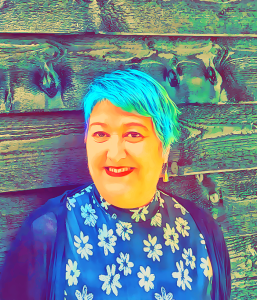192 Letter from María del Pilar Pascual Fraile

Always look at the bright side of life (Monty Phyton)
Letter from the smiley blue-haired academic
Dear future women tourism researchers,
Should I have started with a more academic citation or show a more standardised appearance? Maybe, but I’ve always preferred the words that came from the heart. And Monty Python’s attitude in life. Just a brief introduction of myself to contextualise my letter: after working for 20 years in different communication and marketing firms in the private sector, I arrived in academia when I was 45, and I got my PhD last year, when I was 50. So, I had to learn late in my life how this world worked, and, unfortunately, sometimes fight against ageism. However, those who thought that the age would be a problem did not know that I was prepared for that… and for more, if necessary. Maybe, due to my age.
I still feel like an early career, and I am also very close to the future women tourism researchers, so I think I can understand perfectly well how you feel. You may suffer from ageism just for the contrary reason, because you look ‘too young to be a lecturer/academic’. Therefore, please, find below some obstacles you may find in your incorporation into academia and some tips to face them that I successfully used in these six years:
- With the students. Imposing authority at my age should be easier to achieve than for younger lecturers, so I decided to ‘make things difficult’ by dyeing my hair. It was not only because I love challenges, it was also due to a previously lived situation. When I did my PhD presentation, at my University some voices recommended me a more ‘formal’ appearance that a blue-haired one. Just in case it could affect the opinion of any member of my viva voce panel about my work. I had to decide between my heart, which drove me to be a rebel and my rational mind, not to risk years of hard work because of a hair colour. Ok, I decided that hair colour can be changed (in fact, I did it the following day after the presentation), and I can be a serious and blonde person for one day. But I promised myself that I would start the course with the blue hair, and I would think that day about the reaction of my students and how I would manage to impose authority. First day of class, I asked my students their opinion about my hair. And they replied: ‘ You look great!!’. And I smiled. Perfect, this issue is finished; then, time to work hard, to teach, to learn, to share countless hours in class and outside… Business as usual, independently of the hair colour. Tip extracted: Authority is not about appearance, but treating students as individuals and doing your best to share knowledge.
- With the journals’ system. Unfortunately, ‘publish or perish’ or the pressure in some Universities to publish to move forward or get an accreditation still exists. Ok, these are the rules, you have to follow them, try to be as little personally affected as possible. Fortunately, when we submit a paper, you are in a blind peer review process, no one is judging you for your appearance. And, if rejection of papers is frequent also to first-line academics, what do you expect if you are an early career? In my first published paper in a JCR Q1 I had to go through 3 rounds of reviewers (7 reviewers first time, 5 reviewers second time and 3 reviewers third time). I never gave up. Article published. Tip extracted: the keys to publishing are hard work, learning to cope with frustration, hard work, confidence in the quality of your research, hard work, patience, hard work, humility to accept reviewers’ comments, which are always for good… and hard work, of course. And celebrate when the paper is published. And smile.
- With the colleagues. Beyond fighting against ageism, sometimes we also ‘fight’ against male colleagues, who look down on us only for being women. I’ll be very short in this tip: Ignore them. The world is full of amazing academics to work with, to learn from, to collaborate with, to be enthusiastic about your research proposals… Do not waste your time with people who do not deserve it: go to congresses, meet new academics outside your own university, open your mind, establish networks in which you feel comfortable and valued….
And smile.
Wish you all the best!!!!

María del Pilar Pascual Fraile, PhD
Rey Juan Carlos University, Spain

